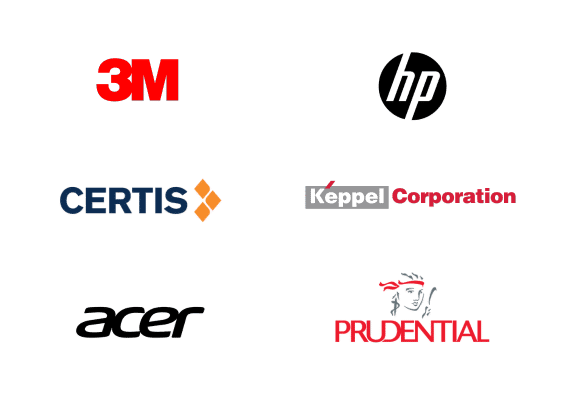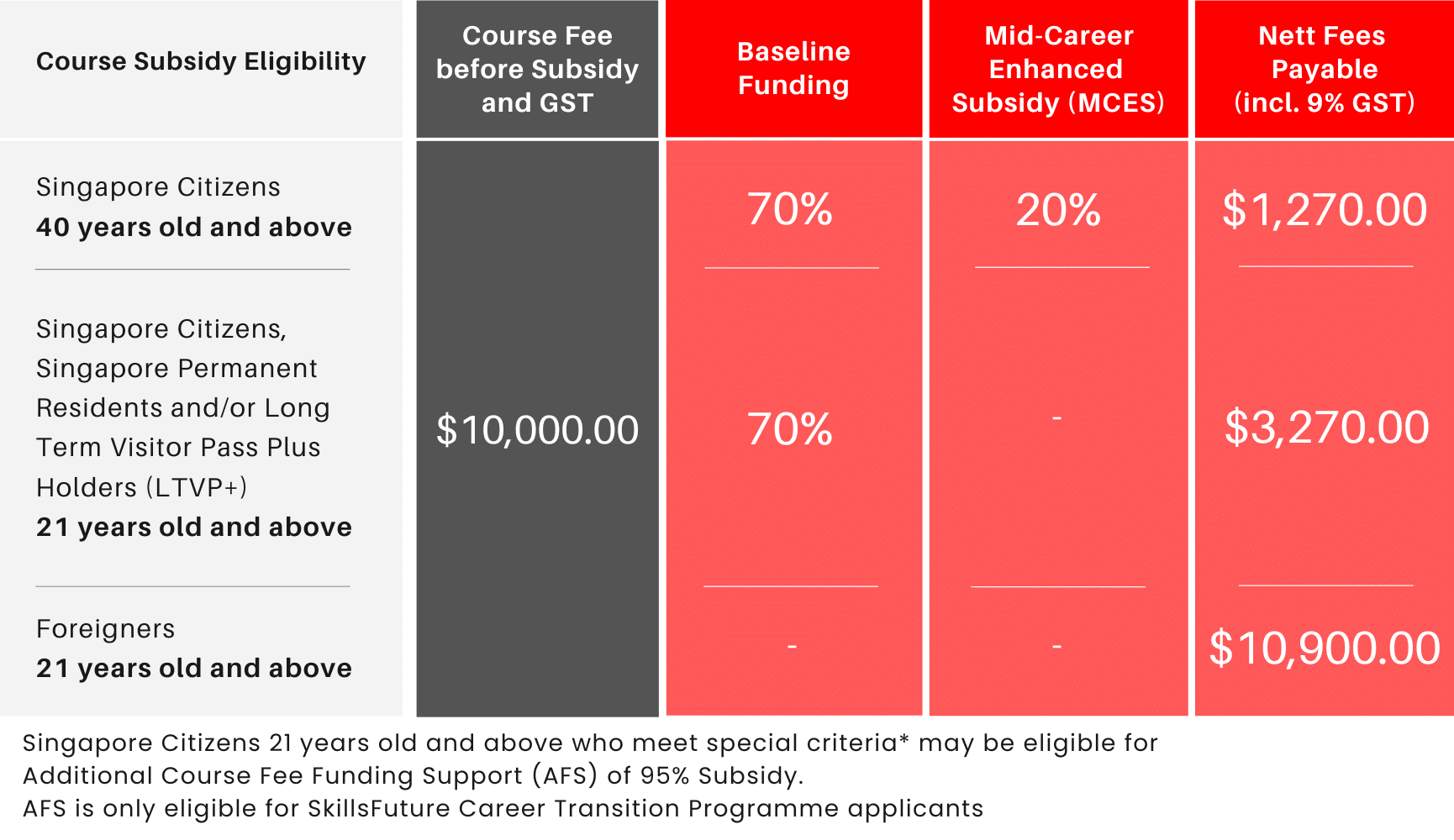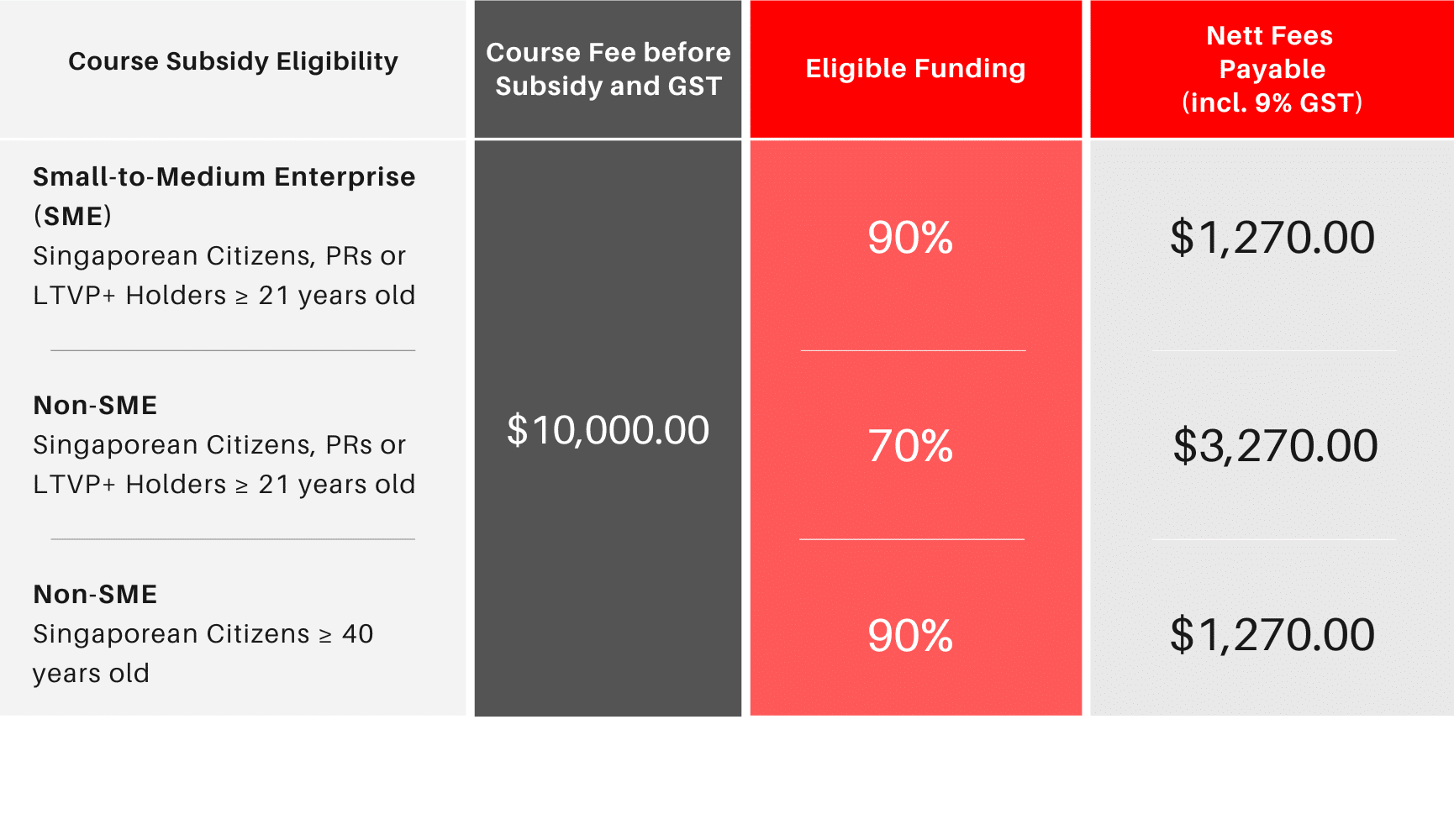Our Clients



Thank you for downloading the programme brochure!
Have Any Questions?
Submit the form below and our programme consultants will get back to you shortly.
What is the SkillsFuture Career Transition Programme?
The SkillsFuture Career Transition Programme (SCTP) is a government initiative in Singapore designed to assist mid-career individuals in acquiring new skills and knowledge to facilitate a career transition. This program is geared towards individuals who wish to switch industries or occupations due to changes in the job market, technological advancements, or personal career goals.
Here are some key features and components of the SkillsFuture Career Transition Programme:
Skills Upgrading: The SCTP provides funding and support for mid-career individuals to undergo training and upskilling in new areas, helping them acquire the skills and knowledge necessary for their chosen career transition.
Financial Support: Participants in the SCTP can receive financial assistance in the form of course fee subsidies and training allowances to ease the financial burden of making a career switch.
Coaching and Mentorship: Participants in the SCTP will receive coaching and mentorship in building a portfolio through a capstone project. This will help participants to increase their employability.
Career Guidance: The program also provides career advisory services and guidance to help individuals get placed in job roles, such as interview preparation, resume tips and more.
Need help? Contact us for more info
Check out more IT Courses here
Course Modules & Curriculum
The Advanced Certificate in Infocomm Technology (Infrastructure and Operations) spans 7 modules (236 hours).
Module 1: Advanced Hardware and Software Troubleshooting
Topics Covered
- Learning Unit 1: Introduction to Advanced Troubleshooting
- Learning Unit 2: Advanced Hardware Troubleshooting Techniques
- Learning Unit 3: Advanced Software Troubleshooting Techniques
- Learning Unit 4: Diagnosis and Resolution of Complex Technical Problems
Hands-On Activity: Troubleshooting in Real-World Scenarios
Assessment
- The assessment consists of a written assessment and a practical performance assessment to demonstrate competencies in the Learning Units of this module.
Learning Outcomes
Upon completion of this course, trainees should be able to demonstrate their skills and knowledge to:
- Evaluate the significance of advanced troubleshooting techniques and methodologies for resolving common hardware and software challenges.
- Implement hardware diagnostics and advanced troubleshooting techniques to resolve complex issues in lab simulations.
- Utilise software debugging and conflict resolution by actively applying diagnostic techniques in real-world scenarios.
- Apply advanced diagnostic and prioritisation skills to efficiently tackle complex technical challenges through practical problem-solving methodologies in real-world scenarios.
- Engage in collaborative problem-solving to address complex hardware and software issues, and effectively communicate the troubleshooting process and solutions in real-world scenarios.
Module 2: Advanced Network Administration
Topics Covered
- Learning Unit 1: Advanced Network Configuration and Administration
- Learning Unit 2: Routing and Switching
- Learning Unit 3: Network Security and Advanced Troubleshooting
- Learning Unit 4: Advanced Network Methodology
Assessment
- The assessment consists of a written assessment and a practical performance assessment to demonstrate competencies in the Learning Units of this module.
Learning Outcomes
Upon completion of this course, trainees should be able to:
- Configure and administer network devices within advanced network topologies and architectures, including the implementation of Virtual LANs (VLANs), Quality of Service (QoS), and techniques for optimising network performance.
- Apply advanced wireless communication concepts and leverage practical experience in setting up sophisticated network configurations to make informed decisions for optimising network administration.
- Analyse and configure routing protocols such as OSPF and BGPm ensuring efficient data routing within complex network infrastructures.
- Apply advanced switching concepts and technologies, including Virtual LANs (VLANs) and Spanning Tree Protocols (STP, RSTP, MSTP).
- Optimise network performance and reliability by employing dynamic routing and route redistribution, and address complex network management through the practical application of routing and switching protocols.
- Apply network security principles and techniques for firewall configuration, intrusion detection, and VPN implementation, ensuring the protection of network assets.
- Acquire advanced troubleshooting skills, including utilising network monitoring tools to identify and resolve complex network issues, thereby maintaining network reliability.
- Apply access control measures effectively, securing network connections and ensuring data confidentiality and integrity within complex network infrastructure.
- Develop the capacity to design complex network configurations and proficiently implement them while considering real-world network situations and adhering to optimisation best practices.
- Perform network security by configuring firewalls and VPNs to safeguard network assets and sensitive data and acquiring proficiency in utilising Network Automation tools.
- Apply advanced troubleshooting techniques to resolve complex network issues, ensuring the uninterrupted operation of network infrastructures and prompt issue resolution.
Module 3: Systems and Server Administration
Topics Covered
- Learning Unit 1: Introduction of Microsoft Server Environment
- Learning Unit 2: Server Installation – Requirement and Techniques
- Learning Unit 3: Deployment of Active Directory Domain Service (ADDS)
- Learning Unit 4: Deployment of DNS and DHCP
- Learning Unit 5: Deployment of disks, file system and storage space
- Learning Unit 6: Deployment of Remote Access Services
- Learning Unit 7: Hyper-V in Windows Server
- Learning Unit 8: High availability (HA) and Disaster recovery (DR)
Assessment
- A written assessment and practical performance that assesses trainees’ capability to diagnose and resolve complex technical issues.
Learning Outcomes
Upon completion of this course, trainees should be able to:
- Explain the distinction between server and server/client concepts, including hardware selection, roles of server components, and comprehend the essentials of Active Directory, Domain Name System, Demilitarized Zone, Cloud Computing, and Virtualisation as integral parts of network infrastructure.
- Select and install server hardware that includes deploying Windows Server through Hyper-V, and successfully executes a secondary installation of Windows Server in a virtual machine environment.
- Set up Active Directory (AD) and effectively manage organisation units (OUs), users, and groups in it, including setting up a Read-Only Domain Controller (RODC) computer object, creating an HR organizational unit using Active Directory Users and Computers (ADUC), and establishing two global HR groups within this OU.
- Set up and integrate Domain Name System (DNS), including configuring DNS zones, records, and conditional forwarding, installing Dynamic Host Configuration Protocol (DHCP), and implementing DHCP scopes, reservations, and failover mechanisms.
Module 4: Cloud Computing
Topics Covered
- Learning Unit 1: Introduction to Cloud Computing
- Learning Unit 2: Cloud Virtual Network
- Learning Unit 3: Cloud Storage
- Learning Unit 4: Cloud Virtual Machines
- Learning Unit 5: Cloud Monitoring
Assessment
- A written assessment and practical performance that assesses trainees’ capability to perform cloud computing.
Learning Outcomes
Upon completion of this course, trainees should be able to:
- Comprehend the fundamental concepts of cloud computing, including its architecture and key characteristics.
- Differentiate between Infrastructure as a Service (laaS), Platform as a Service (PaaS), and Software as a Service (SaaS), including applying the appropriate service model based on use cases.
- Select the optimal suitable cloud deployment model (public, private, hybrid, or community) with security and compliance considerations in mind.
- Configure virtual networks and subnets, including IP addressing.
- Manage different cloud storage solutions, including object, block, and file storage.
- Configure virtual machines that involve sizing, storage, and connections.
- Setup Network Watcher and troubleshoot common networking problems, including configuring Azure Monitor.
Module 5: Cybersecurity and Ethical Hacking
Topics Covered
- Learning Unit 1: Advanced Cybersecurity Principles and Practices
- Learning Unit 2: Penetration testing and ethical hacking methodologies
- Learning Unit 3: Incident response and forensic analysis
Hands-on Activity: Hack the Box
Assessment
- The assessment for this course includes a written test and a practical assessment to evaluate candidates’ capability to perform cybersecurity and ethical hacking.
Learning Outcomes
Upon completion of this course, trainees should be able to demonstrate their skills and knowledge to:
- Distinguish the advanced cyber security concepts, including its application and relevance to organisational security architecture.
- Dissect the methodologies for penetration testing and the various phases of the methodology.
- Examine the methodology for incident response and digital forensic.
- Apply the appropriate penetration testing methodology in the prescribed environment.
Module 6: Emerging Technologies and Trends
Topics Covered
- Learning Unit 1: What are Emerging Technologies?
- Learning Unit 2: How to approach Emerging Technologies?
- Learning Unit 3: Exploration of Emerging Technologies in the IT industry
- Learning Unit 4: Exploration of Digital Workplace Technologies
- Learning Unit 5: Scenario-based Case Study
Assessment
- The assessment is a written assessment.
Learning Outcomes
Upon completion of this course, trainees should be able to demonstrate their skills and knowledge to:
- Describe elements of Emerging Technology.
- Describe the pitfalls of not considering Emerging Technology.
- Review the market trends, including determining when and how to implement Emerging Technologies
- Describe key current Emerging Technology trends in the IT space.
- Explore and comprehend Emerging Technologies such as Artificial Intelligence (Al), Blockchain, Robotic Process Automation, Internet of Things (loT), Virtual/Augmented/Mixed Reality, Cloud Computing and 3D Printing.
- Discuss the concept of a Digital Workplace.
- Describe the evolution of the Workplace in a Post-Pandemic world.
- Recognise and differentiate the technologies that shape the Digital Workplace, including
Visitor Mgmt Systems, Collaboration/Meeting Suites, Building Mgmt Systems, Security/Surveillance Systems, Access Control Systems, Room/Desk Booking Systems, and Multi-Function Devices. - Formulate a proposal to transform and optimise and enterprise through the application
of select emerging and digital workplace technologies.
Module 7: Capstone Project – Real-world IT Project
Overview
Real-world IT Project module comprises five learning units that aim to equip the trainees with the essential skills and knowledge to design, develop, and deliver a significant project in one of two key areas: Penetration Testing Campaign or Cloud Computing Solution.
Learning Units
- Scope Capstone Project
- Documentation of Project
- Performing Work and Managing Stakeholder Communication
- Delivering the Outcomes to the Stakeholders
- Reviewing Work Performed for Capstone
Enrolment Requirements
To apply for the Advanced Certificate in Infocomm Technology (Infrastructure and Operations) Programme, you should possess one of the following qualifications or meet one of these criteria:
- Certificate in IT Infrastructure and Operations; OR
- Mature candidates (≥ 30 years old with 8 years’ work experience in an ICT-related field); or
- Candidates with other qualifications will be considered on a case-by-case basis
Basic computer literacy and fundamental understanding of IT Infrastructure and Operations concepts are required.
All Applicants will go through pre-enrolment screening process.
Application Documents Required:
- Latest resume
- Highest qualification certificate and/or academic transcript
These documents will be reviewed as part of the screening process.
Why Learn From Us
When you learn with us, you will earn an Advanced Certificate, acquiring extensive knowledge from highly experienced industry practitioners who develop and deliver top quality course content through experiential hands-on learning methodologies. What you can expect:
Training led by practitioners with real-world industry experience
Hands-on Practical Projects
Comprehensive, up-to-date curriculum and courseware
Post-course coaching and mentorship
Career advisory and resources support
Hear from our Programme Alumni
Post-Course Support and Outcomes

Upon completing this Advanced Certificate programme, you will receive coaching and mentorship by our programme advisors to complete your capstone project. This capstone project also serves as your portfolio, showcasing your knowledge and skills.
Once the project is completed, you’ll gain access to our dedicated career advisory and resources support. Our career services team will be readily available to provide assistance to enhance your employability, such as Career Assistance Workshops, resume building and interview tips, and more.
Course Fees and Subsidies
Self-Sponsored

Company Sponsored

Criteria and/or Requirements for Course Subsidies
Baseline Funding Criteria and/or Requirements
Trainee is 21 years old and above, and a
- Singaporean Citizen; or
- Permanent Resident; or
- Long Term Visitor Pass Plus (LTVP+) Holder
Will be eligible for 70% SkillsFuture Funding.
Nett course fee payable (including 9% GST): S$3,270
Course fees can be further offset by SkillsFuture Credit for Singapore Citizens aged 25 and above. Singapore Citizens aged 21 to 31 may also offset fees with the Post Secondary Education Account Funds.
Mid-Career Enhanced Subsidy (MCES) Criteria and/or Requirements
Trainee is 40 years old and above, and a Singaporean Citizen, will be eligible for 90% SkillsFuture Funding.
Nett course fee payable (including 9% GST): S$1,270
Course fees after subsidies can be further offset by SkillsFuture Credit.
Company-Sponsored (SMEs)
Enhanced Training Support for SMEs (ETSS) – 90% Funding
Eligible for SME Company-Sponsored, 21 years old and above, and a
- Singapore Citizen; or
- Permanent Resident; or
- Long-Term Visitor Pass Plus (LTVP+) Holder
Nett course fee payable (including 9% GST): S$1,270
Company-Sponsored (Non-SMEs)
SkillsFuture Baseline Funding – 70% Funding
Eligible Non-SME Company-Sponsored, 21 years old and above, and a
- Singaporean Citizen; or
- Permanent Resident; or
- Long Term Visitor Pass Plus (LTVP+) Holder
Nett course fee payable (including 9% GST): S$3,270
SkillsFuture Mid-Career Enhanced Subsidy (MCES) – 90% Funding
Eligible for Non-SME Company-Sponsored, Singapore Citizens, aged 40 years old and above
Nett course fee payable (including 9% GST): S$1,270
Additional Course Fee Funding Support (AFS) Criteria and/or Requirements
Trainee is 21 years old and above, a Singaporean Citzen, and
- Has been in long-term unemployment of 6 months or more*; or
- Recipient of ComCare Short-to-Medium Term Assistance (STMA)* or Workfare Income Supplement (WIS)*; or
- Person with Disabilities
Will be eligible for 95% SkillsFuture Funding.
Nett course fee payable (including 9% GST): S$770
Course fees can be further offset by SkillsFuture Credit for Singapore Citizens aged 25 and above. Singapore Citizens aged 21 to 31 may also offset fees with the Post Secondary Education Account Funds.
*Supporting documents such as CPF, approval letter, and/or payout letter is required to be submitted upon registration. You may request a copy from MSF Social Service Offices or via CPF’s Workfare Portal.
AFS is only eligible for SkillsFuture Career Transition Programme applicants.
NOTE: Trainees are entitled to the SSG training grant when they meet 75% of the training attendance and pass the requisite assessment. If trainees fail the assessment, they are required to re-take it immediately without additional fee. For more details see Course Funding Information.
Important Reminder: Your PSEA claim needs to be submitted at least 1 month before the course’s commencement date. Should you miss this deadline, an alternative payment method must be used to secure your spot in the course. After the disbursement of your PSEA funds to us, we will reach out to initiate the refund process.
Advanced Certificate Course Schedules
Course Duration: 29.5 Days (236 hours)
Average duration to complete: 6 months
- Mar Weekdays Intake 1 (In-Person at IP)
- Apr Weekdays Intake 1 (In-Person at JTC)
- Apr Weekends Intake 1 (In-Person at JTC)
Location:
International Plaza (Tanjong Pager MRT)
10 Anson Road #06-11
Singapore 079903
AM1 Advanced Hardware and Software Troubleshooting
03, 04, 05, 06 Mar 2026 (Tue, Wed, Thu, Fri) 9:00am - 6:00pm
AM2 Advanced Network Administration
11, 12, 13, 16, 17, 18 Mar 2026 (Wed, Thu, Fri, Mon, Tue, Wed) 9:00am - 6:00pm
AM3 Systems and Server Administration
25, 26, 27, 30, 31 Mar 2026, 01 Apr 2026 (Wed, Thu, Fri, Mon, Tue) 9:00am - 6:00pm
AM4 Cloud Computing
06, 07, 08, 09, 10 Apr 2026 (Mon, Tue, Wed, Thu, Fri) 9:00am - 6:00pm
AM5 Cybersecurity and Ethical Hacking
14, 15, 16, 17 Apr 2026 (Tue, Wed, Thu, Fri) 9:00am - 6:00pm
AM6 Emerging Technologies and Trends
23, 24 Apr 2026 (Thu, Fri) 9:00am - 6:00pm
AM7 Capstone Project: Real-world IT Project
29 Apr 2026 (Wed)
30 Apr 2026 (Thu)
05 May 2026 (Tue)
Location:
JTC Summit (Jurong East MRT)
8 Jurong Town Hall Road
Singapore 609434
AM1 Advanced Hardware and Software Troubleshooting
01, 02, 06, 07, 2026 Apr 2026 (Wed, Thu, Mon, Tue, Fri) 9:00am - 6:00pm
AM2 Advanced Network Administration
08, 09, 10, 13, 14, 15 Apr 2026 (Wed, Thu, Fri, Mon, Tue, Wed) 9:00am - 6:00pm
AM3 Systems and Server Administration
23, 24, 27, 28, 29, 30 Apr 2026 (Thu, Fri, Mon, Tue, Wed, Thu) 9:00am - 6:00pm
AM4 Cloud Computing
04, 05, 06, 07, 08 May 2026 (Mon, Tue, Wed, Thu, Fri) 9:00am - 6:00pm
AM5 Cybersecurity and Ethical Hacking
12, 13, 14, 15 May 2026 (Tue, Wed, Thu, Fri) 9:00am - 6:00pm
AM6 Emerging Technologies and Trends
18, 19 May 2026 (Mon, Tue) 9:00am - 6:00pm
AM7 Capstone Project: Real-world IT Project
25 May 2026 (Mon)
26 May 2026 (Tue)
29 Jun 2026 (Mon)
Location:
JTC Summit (Jurong East MRT)
8 Jurong Town Hall Road
Singapore 609434
AM1 Advanced Hardware and Software Troubleshooting
04, 05, 11, 12 Apr 2026 (Sat, Sun, Sat, Sun) 9:00am - 6:00pm
AM2 Advanced Network Administration
18, 19, 25, 26 Apr 2026, 02, 03 May 2026 (Sat, Sun) 9:00am - 6:00pm
AM3 Systems and Server Administration
09, 10, 16, 17, 23, 24 May 2026 (Sat, Sun, Sat, Sun, Sat, Sun) 9:00am - 6:00pm
AM4 Cloud Computing
30 May 2026, 06, 07, 13, 14 Jun 2026 (Sat, Sun) 9:00am - 6:00pm
AM5 Cybersecurity and Ethical Hacking
20, 21, 27, 28 Jun 2026 (Sat, Sun, Sat, Sun) 9:00am - 6:00pm
AM6 Emerging Technologies and Trends
04, 05 Jul 2026 (Sat, Sun) 9:00am - 6:00pm
AM7 Capstone Project: Real-world IT Project
11 Jul 2026 (Sat)
12 Jul 2026 (Sun)
16 Aug 2026 (Sun)
Frequently Asked Questions (FAQ)
General Questions
What is an Advanced Certificate and how is it different from the Certificate in Infocomm Technology (Infrastructure and Operations)?
In Singapore, an Advanced Certificate is typically a higher qualification than a regular Certificate. If you’re considering the Advanced Certificate in Infocomm Technology (Infrastructure & Operations), you likely already have a basic understanding of IT. The Advanced Certificate involves more in-depth study and a higher level of difficulty.
What is the course duration for the Advanced Certificate in Infocomm Technology (Infrastructure and Operations)?
The course duration is 29.5 days (236 hours). The average duration to complete this course is 6 months.
What is covered in the Advanced Certificate in Infocomm Technology (Infrastructure & Operations) course?
This course builds on your existing IT knowledge and equips you with advanced troubleshooting skills for hardware, software, and networks. You’ll also learn to manage Microsoft Server environments, including Active Directory, storage solutions, and virtualisation with Hyper-V.
To find out more about all the modules covered in the course, refer to our course curriculum above.
Who is the Advanced Certificate in Infocomm Technology (Infrastructure and Operations) for?
This Advanced Certificate is ideal for IT professionals in Singapore looking to advance their careers in infrastructure and operations. It’s also suitable for individuals with an existing foundation in IT who want to specialise in server administration and network troubleshooting.
Is there a hands-on component in the Advanced Certificate in Infocomm Technology (Infrastructure and Operations) course?
Yes, the course includes hands-on activities and a Capstone Project at the end of this course. This is to solidify your understanding of the concepts and allow you to practice your newly acquired skills in real-world scenarios.
What are the prerequisites for the Advanced Certificate in Infocomm Technology (Infrastructure and Operations)?
- Certificate in IT Infrastructure and Operations; OR
- Mature candidates (equal or more than 30 years old with 8 years’ work experience in a related field); OR
- Candidates with other qualifications will be considered on a case-by-case basis
How do I register for the course?
You can register for the programme here.
What are the course schedules?
We have multiple intakes available. Please check our course schedule above for the latest schedules or if you require more assistance, drop us a message and our course consultants will be happy to help.
Are there any subsidies available?
Yes, you may be eligible for subsidies to help you offset the cost of the Advanced Certificate in Infocomm Technology (Infrastructure & Operations) course with up to 95% SkillsFuture funding.
For more details on the courses and available funding, check out the course fees and subsidies section above or get in touch with our team for further clarification.
Part-Time Training Allowance
I am 43 years old and currently working. Am I eligible for the Part-Time Training Allowance?
Yes, you are likely eligible if:
- You are a Singapore Citizen aged 40 and above.
- You are employed and have received income in the latest available 12-month period before your course start date or application date (whichever is later).
- You have not used up your 24-month lifetime allowance cap (combined full-time and part-time).
- You have a PayNow account linked to your NRIC.
Self-employed individuals with income declared to IRAS may also qualify. For more information on the eligibility criteria, visit the official SkillsFuture Service portal.
How much Training Allowance will I receive for part-time SCTP courses?
You will receive a flat rate of S$300 per month for each eligible month of training, provided you meet the minimum 75% monthly attendance requirement.
The total number of months you can claim is based on the approved duration of your course, rounded to the nearest half-month.
My part-time course runs from 15 February to 15 March. Will I receive the full $300 for both months?
Yes, SSG uses a front-loading approach. You will receive the full S$300 for the first month (February), and the remaining allowance will be paid for subsequent months based on attendance.
Always check your TA offer letter for your specific Maximum Eligible Period (MEP).
What happens if I miss the deadline to accept my Training Allowance offer?
You must accept your TA offer within 3 calendar days of receiving it. If you miss this deadline, your application will be cancelled, and you will need to submit a new application.
We recommend logging into the TA Portal regularly to check your application status.
Can I apply for Training Allowance if I am self-employed or have no CPF contributions?
Yes, if you are self-employed and have declared your trade income to IRAS, SSG will use the latest available IRAS data to assess your eligibility.
If you have no CPF contributions but have earned income in the last 12 months, you may still qualify. The best way to check is to log in to the TA Portal and submit an application; the system will determine your eligibility automatically.
If you encounter issues, you may contact SSG via their Service Portal.
Where can I find and search for courses that are eligible for the Part-Time Training Allowance?
You can search for all TA-eligible courses, including part-time ones, directly on the MySkillsFuture portal. This is the official course directory where you can filter for programmes that qualify for the Training Allowance.
Follow these simple steps:
- Login to www.myskillsfuture.gov.sg with your Singpass.
- Search for a course title or keyword related to your area of interest.
- Apply the filter: Under the "Featured Initiatives" filter, check the box for "SkillsFuture Mid-Career Training Allowance (Part-Time)" . This will show you only the courses that are eligible.
Tip: All our SCTP courses listed on the @ASK Training website are also PT TA-eligible. You can also find them on the MySkillsFuture portal by searching for our course titles or UEN.
Do I need to repay my Part-Time Training Allowance if I fail my course assessment?
No. The Training Allowance is not based on whether you pass your course assessment. It is paid based on your fulfilment of the minimum 75% monthly attendance requirement.
As long as you met the attendance criteria and provided truthful information in your application, you do not need to repay any disbursed allowance.
Still Have Questions?
The SkillsFuture Service Portal contains:
- Detailed FAQs on Part-Time Training Allowance
- Guides and resources
- Submit an enquiry if you have further questions
Speak to a programme consultant
Have questions? Speak to our program consultants!

